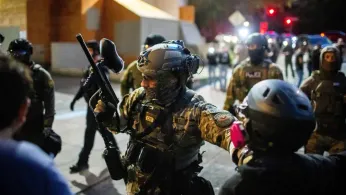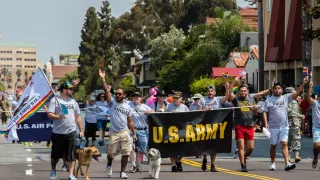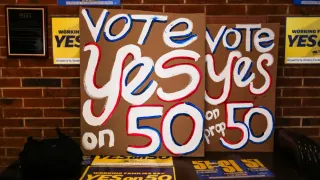
Oct 6
Federal Judge Temporarily Blocks Trump Administration From Sending National Guard Troops to Oregon
Christopher Weber and Jack Brook READ TIME: 4 MIN.
A federal judge late Sunday temporarily blocked the Trump administration from deploying any National Guard units to Oregon at all, after a legal whirlwind that began hours earlier when the president mobilized California troops for Portland after the same judge blocked him from using Oregon's National Guard the day before.
During a hastily called evening telephone hearing, U.S. District Judge Karin Immergut granted a temporary restraining order sought by California and Oregon.
Immergut, who was appointed by President Donald Trump in his first term, seemed incredulous that the president moved to send National Guard troops to Oregon from neighboring California and then from Texas on Sunday, just hours after she had ruled the first time.
“How could bringing in federalized National Guard from California not be in direct contravention to the temporary restraining order I issued yesterday?” she questioned the federal government's attorney, cutting him off.
“Aren’t defendants simply circumventing my order?” she said later. “Why is this appropriate?”
The White House did not immediately comment on the judge’s decision.
Oregon is fighting to prevent federalized National Guard troops from coming to Oregon's largest city to address ongoing protests at an immigration processing facility there.
Small protests have been going on outside the Immigration and Customs Enforcement facility since Trump’s second term began in January. There have been occasional flare-ups, including in June, but for weeks nightly demonstrations attracted only a few dozen people.
Trump, however, has turned his attention to the city, calling Portland “war ravaged,” and a “war zone” that is “burning down” and like “living in hell.”
Local officials have pointed out that the protest occupies one city block far from the downtown in a city that covers 145 square miles (376 square kilometers). They also say many of his claims and social media posts appear to rely on images from 2020, when unrest that grew out of the Black Lives Matter protests roiled the city for several months. Trump sent federal law enforcement to the city then, as well.
Under a new mayor and police chief, the city has reduced crime, and the downtown has seen a decrease in homeless encampments and increased foot traffic.
On Sept. 28, when the Trump administration mobilized the Oregon National Guard over Gov. Tina Kotek's wishes, the protests increased in size. On Saturday about 400 people gathered outside the ICE facility before federal agents shot tear-gas canisters into the crowd.
Trump also authorized the deployment of 300 Illinois National Guard troops to protect federal officers and assets in Chicago on Saturday.
Illinois Gov. JB Pritzker’s office said the situation in Chicago “does not require the use of the military and, as a result, the Governor opposes the deployment of the national guard under any status.”
This weekend, about 200 federalized members of the California National Guard who had been on duty around Los Angeles were reassigned to Portland, a Pentagon spokesperson said.
Approximately 100 California National Guard troops landed in Portland after midnight Sunday and around 100 more arrived by early evening, Alan Gronewold, commander of Oregon’s National Guard, said in a court filing before the emergency hearing late Sunday.
The state of Oregon also included in its filing a memo written by Defense Secretary Pete Hegseth that ordered up to 400 Texas National Guard personnel activated for deployment to Oregon, Illinois and possibly elsewhere.
At the emergency hearing late Sunday, Immergut grilled the attorney for the federal government and accused them of seeking an end run around her order from the day before that temporarily blocked the deployment of National Guard troops in Oregon.
Scott Kennedy, the attorney representing Oregon, said he learned of the Texas National Guard mobilization just 24 minutes before the emergency hearing on Sunday night.
“It feels a little bit like we’re playing a game of rhetorical whack-a-mole here,” he told Immergut.
Lawyers for the federal government tried to argue that Oregon and Portland did not have standing and that California could show no harm by having some of its National Guard dispatched to another state.
Immergut issued a temporary order that expires in 14 days unless it is extended at a hearing set for Oct. 17. Arguments for a preliminary injunction — a more permanent block on sending federalized National Guard troops to Oregon — are set for Oct. 29.
In a related court filing, an attorney in the California Military Department said the U.S. Army Northern Command advised the department on Sunday that an order will be issued keeping the 300 guard personnel federalized through the end of January.
Kotek, the governor of Oregon, applauded Immergut's ruling and said Trump can “expect Oregon to stand up to him at every turn.”
“President Trump’s actions are an effort to occupy and incite cities and states that don’t share his politics, and I believe that we should expect him to continue to push the limits of his authority," she said in a statement late Sunday.
California Attorney General Rob Bonta said Trump's move to deploy the National Guard of one state to another “is well outside of the norms or practices” of any president.
“But this President is determined to take as much power as the courts will give him. This fight isn’t over, but today’s rebuke of the President’s illegal actions is a step in the right direction,” Bonta said in a statement after Sunday night's ruling.
Portland Mayor Keith Wilson said Sunday that he saw federal agents engaged in what he described as unjustified use of force and indiscriminately spraying pepper spray and impact munitions during a protest outside the ICE facility.
“This is an aggressive approach trying to inflame the situation that has otherwise been peaceful,” Wilson said, adding that he has alerted the civil rights division of the Department of Justice to the agents’ actions.






